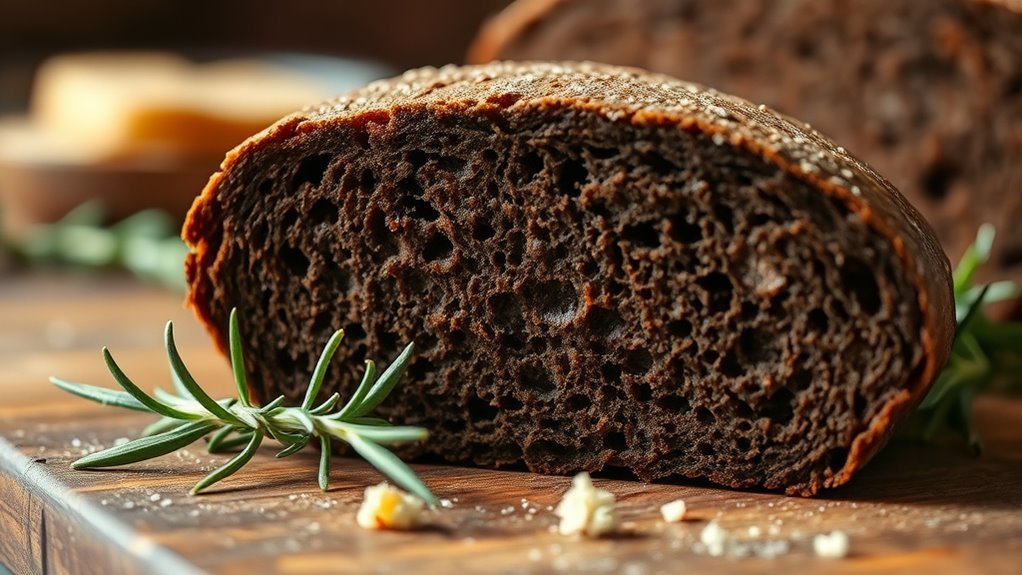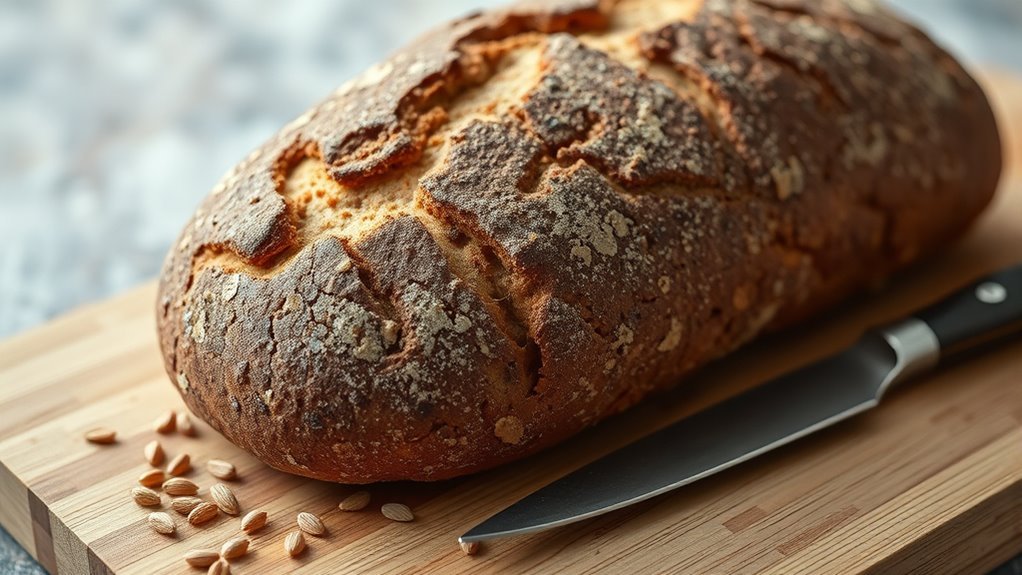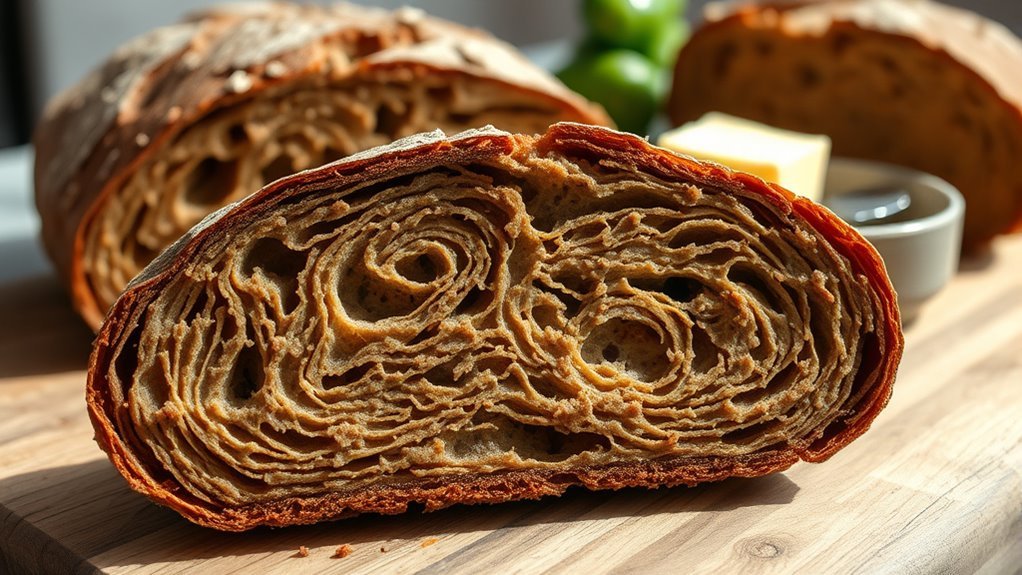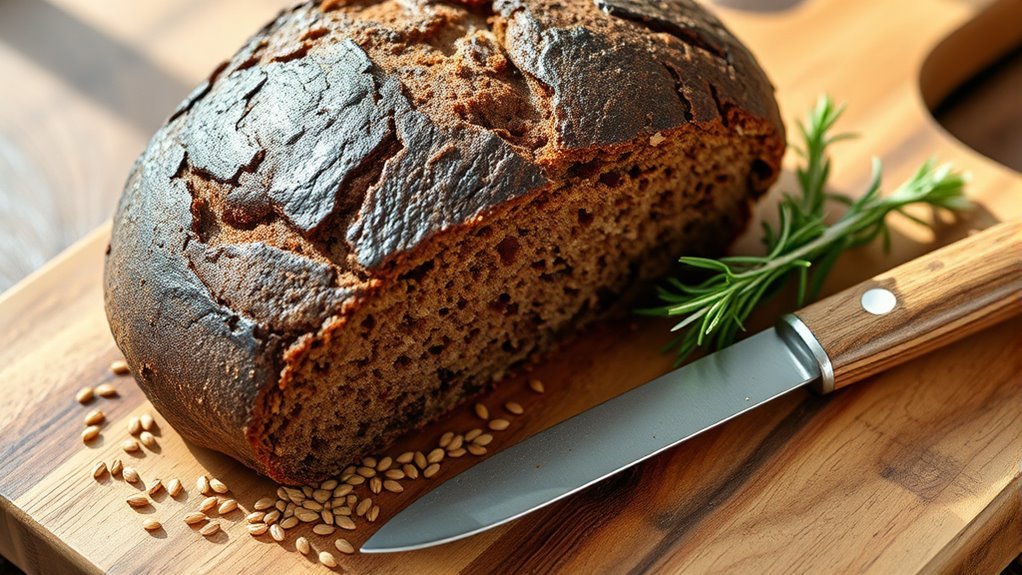Rye bread isn’t considered keto-friendly due to its relatively high carbohydrate content, which can disrupt ketosis. Varieties like dark rye contain around 48g of carbs per 100g, making it challenging to maintain a low-carb diet. While rye bread does offer health benefits and fiber, it’s not ideal for those aiming to stay in ketosis. If you’re curious about better options and how to incorporate them, there are certainly alternatives worth exploring.
Understanding the Carbohydrate Content of Rye Bread

When considering whether rye bread fits into a keto diet, it’s vital to understand its carbohydrate content. Rye bread, made primarily from rye flour, typically contains more carbohydrates compared to other low-carb options. The carbohydrate sources in rye bread include starches and sugars, which can impact your daily carb limits on a keto diet. However, it also offers various fiber types, such as soluble and insoluble fiber, which can aid digestion and may reduce the net carbs when calculating your intake. Despite these benefits, consuming rye bread could still hinder ketosis due to its overall carb load. As a result, if you’re aiming for strict carb control, it’s essential to evaluate how rye bread aligns with your dietary goals.
Nutritional Profile of Rye Bread

Rye bread’s nutritional profile reveals important details that can help you assess its fit within your diet. It typically contains about 80 calories per slice, with a decent amount of fiber, which contributes to better digestion. The rye benefits include its low glycemic index, helping stabilize blood sugar levels. Additionally, rye is rich in vitamins and minerals, such as B vitamins and magnesium. However, if you’re looking for rye alternatives, consider options like almond flour or coconut flour, which are lower in carbs and higher in healthy fats, making them more suitable for a keto lifestyle. Ultimately, understanding these nutritional aspects can empower you to make informed dietary choices based on your health goals.
Comparing Rye Bread to Other Bread Types

While many types of bread offer distinct nutritional benefits, rye bread stands out in several key areas when compared to more common options like white or whole wheat bread. For starters, rye bread typically has a lower glycemic index, meaning it may result in a slower rise in blood sugar levels. This is particularly important for those monitoring their carbohydrate intake. Additionally, rye bread often contains more fiber than other breads, which can improve digestive health and promote satiety. It also tends to have a richer flavor profile, making it a popular choice for various dishes. Ultimately, if you’re looking to diversify your bread options, rye bread offers unique advantages that may align better with your dietary goals compared to other breads.
Health Benefits of Rye Bread
Choosing rye bread not only diversifies your diet but also brings a range of health benefits. One of the key nutritional advantages of rye bread is its high fiber content, which aids digestion and promotes a feeling of fullness. This can help you manage your weight effectively. Additionally, rye bread has a lower glycemic index than many other breads, which means it can help stabilize blood sugar levels. It’s also rich in essential nutrients like B vitamins, iron, and magnesium, contributing to overall health. Moreover, the antioxidants found in rye can support heart health by reducing inflammation. Incorporating rye bread into your meals can be a delicious way to enhance your nutrition while enjoying a variety of flavors.
How Rye Bread Affects Ketosis
When considering rye bread in relation to ketosis, it’s important to analyze its carbohydrate content, as this can greatly impact your state of ketosis. Additionally, the fiber found in rye bread may provide digestive benefits, which can be beneficial for overall health. Finally, understanding the glycemic impact of rye bread can help you determine how it fits into your low-carb lifestyle.
Carb Content Analysis
Rye bread, often praised for its hearty texture and distinct flavor, contains a considerable amount of carbohydrates, which can impact your journey into ketosis. While some rye varieties might offer more fiber and nutrients than traditional white bread, their carb content still poses a challenge for those following a strict keto diet.
Here’s a quick breakdown of carb content in common rye varieties:
| Rye Variety | Carbohydrates (per 100g) |
|---|---|
| Dark Rye Bread | 48g |
| Light Rye Bread | 47g |
| Rye Crispbread | 75g |
| Pumpernickel | 50g |
| Rye Flour | 76g |
If you’re seeking keto-friendly options, it is crucial to monitor your intake carefully.
Fiber Benefits
Considering the carbohydrate content previously discussed, it’s important to note that rye bread also offers notable fiber benefits, which can influence its overall impact on ketosis. Rye bread is a good source of dietary fiber, which plays a critical role in digestive health. High fiber sources like rye can help regulate your digestion, promoting regular bowel movements and reducing feelings of bloating. Additionally, fiber can aid in the management of hunger, potentially supporting your keto goals by helping you feel full longer. While ketosis relies on low carbohydrate intake, the fiber in rye bread can provide essential nutrients without greatly impacting your carb limit. So, incorporating rye bread mindfully could offer health benefits while still aligning with your dietary preferences.
Glycemic Impact
Although many people enjoy rye bread for its flavor and texture, understanding its glycemic impact is vital for those following a ketogenic diet. Rye bread typically has a lower glycemic index compared to white bread, which means it may cause a more gradual insulin response. However, it still contains carbohydrates that can potentially affect ketosis. If you’re monitoring your carbohydrate intake closely, even the lower glycemic options might not fit into your daily limits. It’s important to take into account portion sizes and how rye bread fits into your overall dietary goals. Ultimately, while rye bread might offer some benefits, its impact on ketosis should be carefully evaluated to maintain your desired state of metabolic freedom.
Incorporating Rye Bread Into Your Keto Diet
When you’re looking to incorporate rye bread into your keto diet, it is essential to understand its nutritional profile and how it fits within your carbohydrate limits. Rye bread generally contains more carbs than other low-carb options, so moderation is key. You can enjoy it in small amounts while focusing on high-fiber varieties that can help keep you fuller longer. Consider rye bread recipes that include keto-friendly toppings like avocado or smoked salmon for a satisfying meal. Pair it with hearty salads or soups for balanced keto meal ideas. Always track your carb intake to guarantee you stay within your goals. With mindful consumption, you can enjoy the unique flavors of rye bread without straying from your keto journey.
Alternatives to Rye Bread for Keto Followers
If you’re looking for alternatives to rye bread on a keto diet, several options can fit your needs. Cloud bread is a popular low-carb substitute, while almond flour bread provides a nutty flavor with fewer carbs. Lettuce wraps are also a great choice for holding your favorite fillings without adding extra carbs.
Cloud Bread Option
While traditional rye bread isn’t typically considered keto-friendly due to its higher carbohydrate content, cloud bread serves as an excellent alternative for those following a ketogenic diet. Made primarily from eggs and cream cheese, it’s low in carbs and high in healthy fats. One of the key cloud bread benefits is its versatility; you can use it for sandwiches, pizzas, or even sweet treats. Plus, it’s easy to make with a simple cloud bread recipe that combines just a few ingredients. This bread-like option allows you to enjoy a satisfying texture without compromising your carb limits. So, if you’re craving bread on keto, cloud bread might just be the freedom you need to stay on track with your diet.
Almond Flour Bread
Cloud bread offers a fantastic low-carb solution, but almond flour bread is another great option for those on a ketogenic diet. Almond flour is a popular choice because it’s rich in healthy fats and low in carbohydrates, making it a perfect fit for keto followers. One of the notable almond benefits is its high vitamin E content, which supports skin health and offers antioxidant properties. By using almond flour, you can create a variety of baked goods that not only satisfy your cravings but also keep you within your carb limits. This versatile ingredient can be used in bread, pancakes, and even muffins, providing delicious low carb alternatives while maintaining the freedom to enjoy your favorite foods.
Lettuce Wraps Substitute
For those on a ketogenic diet, finding alternatives to traditional bread can be essential for maintaining low carbohydrate intake. Lettuce wraps are a popular option due to their versatility and health benefits. They’re low in calories and carbs, making them an ideal substitute. Here are some wrap ideas to get you started:
- Turkey and cheese: Layer deli turkey and cheese with mustard in romaine leaves.
- Tuna salad: Fill butter lettuce with a mix of tuna, mayo, and diced celery.
- Chicken fajitas: Wrap grilled chicken, peppers, and guacamole in large lettuce leaves.
- Veggie medley: Combine your favorite veggies and hummus for a revitalizing bite.
Embrace these lettuce benefits while enjoying delicious, low-carb meals!
Frequently Asked Questions
Can I Eat Rye Bread While on a Strict Keto Diet?
Think of your diet like a tightrope walk—one misstep, and you’re off balance. If you’re on a strict keto diet, rye bread might not be the best choice. It typically contains more carbs than keto alternatives. Instead, consider bread substitutes like almond flour or coconut flour options that keep your carb intake low. These can provide the texture you crave without derailing your progress, allowing you to enjoy your meals while sticking to your goals.
What Type of Rye Bread Is the Lowest in Carbs?
When looking for the lowest carb varieties of rye bread, you should focus on those made with a higher percentage of rye flour and fewer additives. Brands that specialize in low-carb options often offer rye bread containing alternative flours, like almond or coconut flour, which can greatly reduce carb content. Always check the nutrition label to verify you’re selecting a product that aligns with your dietary goals while still enjoying the unique taste of rye.
Does Rye Bread Contain Gluten?
Yes, rye bread does contain gluten, which can be a concern for those with gluten sensitivity or celiac disease. While rye has less gluten than wheat, it’s still not suitable for those avoiding gluten entirely. If you’re looking for alternatives, consider options like almond flour or coconut flour, which are gluten-free and can be used to create delicious bread substitutes. Always check labels to verify any alternative meets your dietary needs.
Is Sourdough Rye Bread Better for Keto?
When considering if sourdough rye bread is better for keto, it’s essential to look at sourdough fermentation. This process can reduce gluten content and make bread easier to digest, potentially offering a lower glycemic index. However, it’s still important to weigh this against keto-friendly alternatives. If you’re aiming to minimize carbs, options like almond or coconut flour bread might be more suitable. Ultimately, it’s about finding what fits best with your dietary goals.
How Does Rye Bread Affect Blood Sugar Levels?
Think of blood sugar as a tide, rising and falling with each food choice you make. When you eat rye bread, its fiber can slow glucose absorption, leading to a more gradual insulin response. However, individual reactions vary; some might experience a sharper spike than others. Monitoring your levels post-consumption can help you gauge how rye bread affects your body. Freedom in dietary choices often comes from understanding these effects on your health.
Frequently Asked Questions about Rye Bread and Keto
1. Is rye bread suitable for a keto diet?
Rye bread is generally not considered suitable for a ketogenic (keto) diet. While it is made from whole grains and offers some nutritional benefits, it contains higher amounts of carbohydrates compared to foods typically consumed on a keto diet. A standard slice of rye bread can have around 15-20 grams of carbohydrates, which can exceed the daily carb limit for those adhering to keto, usually set at 20-50 grams per day.
2. What makes a bread keto-friendly?
Keto-friendly breads are typically low in carbohydrates and high in healthy fats. These breads are often made from alternative flours such as almond flour, coconut flour, or flaxseed meal. They may also include ingredients that provide fiber and protein, helping to keep the carb count low while offering a satisfying texture. Always check the nutritional labels to ensure that the bread fits within your daily carb goals.
3. Are there any low-carb alternatives to rye bread?
Yes, there are several low-carb alternatives to rye bread that are suitable for a keto diet. Options include cloud bread, almond flour bread, and flaxseed bread. These alternatives are typically much lower in carbohydrates and can provide a similar texture and flavor that you might enjoy. Additionally, lettuce wraps can be used in place of bread for sandwiches, offering a fresh and crunchy alternative.
4. Can I have rye bread on a low-carb diet?
Yes, you can include rye bread in a low-carb diet depending on your specific carb allowance and dietary goals. Some people following a low-carb diet may allow for small portions of rye bread, especially if it fits within their total carbohydrate intake for the day. However, it’s essential to monitor how it affects your overall carb consumption and adjust accordingly.
5. What are the health benefits of rye bread?
Rye bread offers several health benefits, including being a good source of dietary fiber, which can aid in digestion and help maintain a healthy gut. It also provides essential nutrients such as B vitamins, iron, and magnesium. Additionally, rye has a lower glycemic index compared to wheat, which means it can help regulate blood sugar levels more effectively. However, these benefits must be weighed against its carbohydrate content when considering it for a keto diet.
References
- https://www.ncbi.nlm.nih.gov/pmc/articles/PMC7070586/
- https://www.healthline.com/nutrition/keto-diet-foods
- https://www.webmd.com/diet/what-is-the-keto-diet
- https://www.mayoclinic.org/healthy-lifestyle/nutrition-and-healthy-eating/in-depth/keto-diet/art-20411517
- https://www.wheatbellyblog.com/2012/11/health-benefits-of-rye-bread/
- https://www.nutrition.org.au/nutrition-topics/bread-and-cereal-foods/
- https://www.verywellfit.com/how-rye-bread-fits-into-your-diet-5201375


